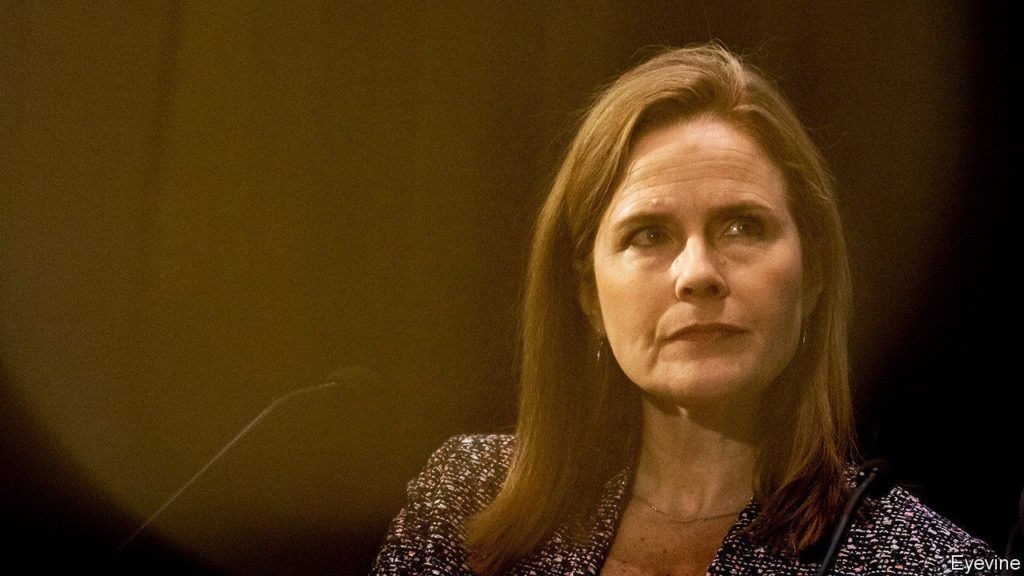If confirmed by the Senate, the 48-year-old appeals-court judge will cement a 6-3 conservative majority on America’s highest court
FOR THE third time in his first term as president, Donald Trump has nominated a young and highly conservative appeals-court judge to fill a Supreme Court vacancy. Mr Trump’s choice on September 26th of Amy Coney Barrett may be his most consequential pick yet. In 2017 and 2018, the president replaced Republican-appointed justices with mostly like-minded successors. With his selection of Ms Barrett, aged 48, to take a seat held for 27 years by Ruth Bader Ginsburg, a liberal icon, Mr Trump is set to knock the Supreme Court off its ideological equilibrium for decades.
Mr Trump’s nominations of Neil Gorsuch and Brett Kavanaugh came after much diversion and drama. There was little attempt at surprise this time. Though Mr Trump said on September 21st that five candidates were under consideration, he held meetings with only one and word emerged a full day before the White House rose garden ceremony that Ms Barrett would get the nod.
A judge since 2017 on the Seventh Circuit Court of Appeals, Ms Barrett is, to Mr Trump, who tapped her for that job, “a woman of unparalleled achievement, towering intellect, sterling credentials and unyielding loyalty to the constitution.” The top student in her law-school class at Notre Dame, she clerked for Justice Antonin Scalia after one of her professors sent the legendary conservative jurist a one-sentence recommendation: “Amy Coney is the best student I ever had.” Ms Barrett went on to teach for 15 years at her alma mater, where she garnered the top teaching prize three times. A wide array of students and colleagues support her nomination.
Ms Ginsburg is to be buried this week at Arlington National Cemetery; both Mr Trump and Ms Barrett acknowledged, to scant applause, her profound influence on the law. “Should I be confirmed”, the potential 115th justice said, “I will be mindful of who came before me.” Ms Ginsburg “not only broke glass ceilings, she smashed them,” Ms Barrett said. Seizing the moment, if not standards of good taste, the National Republican Senatorial Committee unveiled via Twitter a fundraising campaign based around a “Notorious ACB” T-shirt that co-opts Justice Ginsburg’s celebrity nickname and image. Mitch McConnell, the Senate majority leader, who has reneged on the position he took in 2016 that Supreme Court vacancies should remain unfilled in election years, said “it does seem fitting that another brilliant and talented woman at the height of their shared profession would follow in [Justice Ginsburg’s] footsteps onto the court.”
The brilliance and talent of Ms Barrett are not the only virtues that made her a natural fit for this appointment. Since the 1980s Republicans have had Roe v Wade—the Supreme Court ruling in 1973 that legalised abortion nationwide—in their cross-hairs. The court has overseen a chipping away of abortion rights in the ensuing decades. A late-term abortion method has been banned; regulations of questionable value have shuttered clinics; women seeking to end their pregnancies have been required to abide sonograms, waiting periods, parental notice and other hurdles. But if Ms Barrett finds herself moving to Washington, DC, the Supreme Court may soon have a majority to erase Roe from the books and turn the question of abortion rights back to individual states.
At Notre Dame, Ms Barrett was a member of University Faculty for Life (a group for those “who respect the value of human life from conception to natural death”) and was open about her belief that life begins at conception. She has written that abortion is “always immoral” and has joined rulings on the Seventh Circuit giving states licence to restrict abortion. In light of her view that Supreme Court justices have little duty to uphold precedents they believe are wrong—a view tracking that of Justice Clarence Thomas, on the court’s extreme-right flank—pro-choice and pro-life observers alike believe she will not see herself as duty-bound to keep Roe afloat.
Ms Barrett has taken a conservative line on other key issues in her several years on the federal bench. In 2019 she wrote of the “natural right of self-defence” animating the Second Amendment when dissenting from a ruling that allowed states to ban convicted felons from owning guns. A fraught racial-discrimination case in 2017 involved a car-accessories retailer that had assigned employees to stores based on their race—with African-American workers dispatched to areas of town where more African-Americans lived. After a three-judge panel dismissed the Equal Employment Opportunity Commission’s worry about this arrangement, Ms Barrett voted against re-hearing the case as a full court. Several other members of the Seventh Circuit blasted that decision as reminiscent of the “separate but equal” regime deemed unconstitutional nearly seven decades ago in Brown v Board of Education.
On matters of immigration and gender politics, Ms Barrett seems in line with Republican priorities, too. This past June, Ms Barrett dissented from a ruling blocking Donald Trump’s “public charge” rule that denies green cards to immigrants who rely too heavily on government benefits. In 2019, Ms Barrett also joined an opinion permitting a male student to sue the university that disciplined him after an alleged episode of sexual violence. University officials may have sided with the female accuser, Ms Barrett wrote, “because she is a woman and…disbelieve[d] John Doe because he is a man.”
Since Ms Ginsburg’s death, Democrats have been crying foul that Republican senators abandoned their position from 2016 when they refused to countenance Merrick Garland, Mr Obama’s pick for Mr Scalia’s seat, on the purported principle that voters should have a voice on the vacancy. They are sure to deride that double standard when Ms Barrett comes in for hearings, especially as early voting in the November elections is already under way in several states. But with 47 votes in the 100-seat Senate and only two Republicans who say they oppose a quick nomination, Democrats have little chance to stop Ms Barrett.
Instead, Democrats seem to be focusing on what Ms Barrett’s nomination means for health care, in an effort to mobilise voters against Mr Trump and down-ballot Republican candidates in November. The Supreme Court is taking up a constitutional challenge to the Affordable Care Act on November 10th, one week after the election, and the White House is joining the effort to invalidate the law following two unsuccessful Supreme Court reckonings in the past eight years. Joe Biden tweeted after the rose-garden nomination ceremony that Ms Barrett is “a jurist with a written track record of disagreeing with the court’s decision to uphold the Affordable Care Act”. That is true: she criticised Chief Justice John Roberts for coming to Obamacare’s rescue in National Federation of Independent Business v Sebelius (2012). But it is not necessarily the case that Ms Barrett would vote to kill Obamacare this time around should she be seated in time for the oral argument in California v Texas: the nature of the legal challenge is quite different.
Ms Barrett closed her statement at the White House by saying she has “no illusions that the road ahead of me will be easy, either for the short term or the long haul.” Mr Trump, with perhaps a keener sense of how raw power operates with the Machiavellian Senator McConnell running the show, ended on a reassuring note. “I know you’re going to have a busy couple of weeks,” he said to his nominee, “but I think it’s going to be easier than you might think.”
By The Economist





